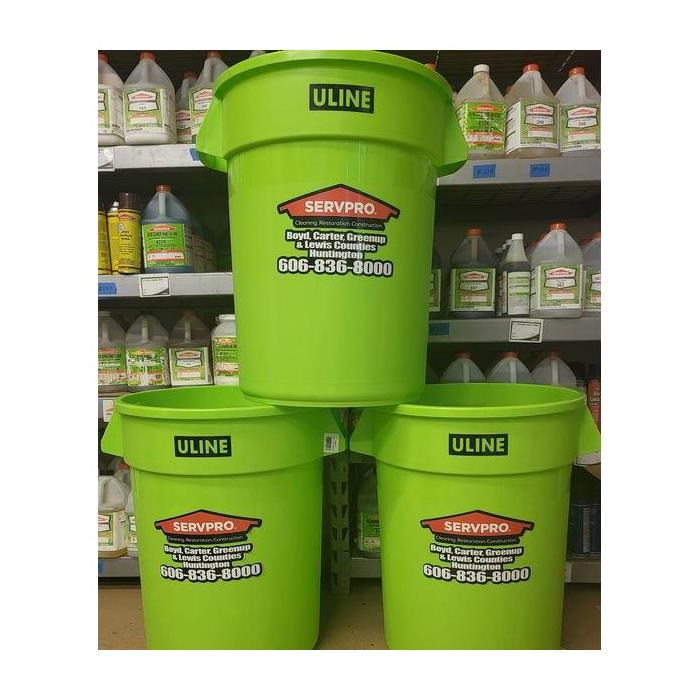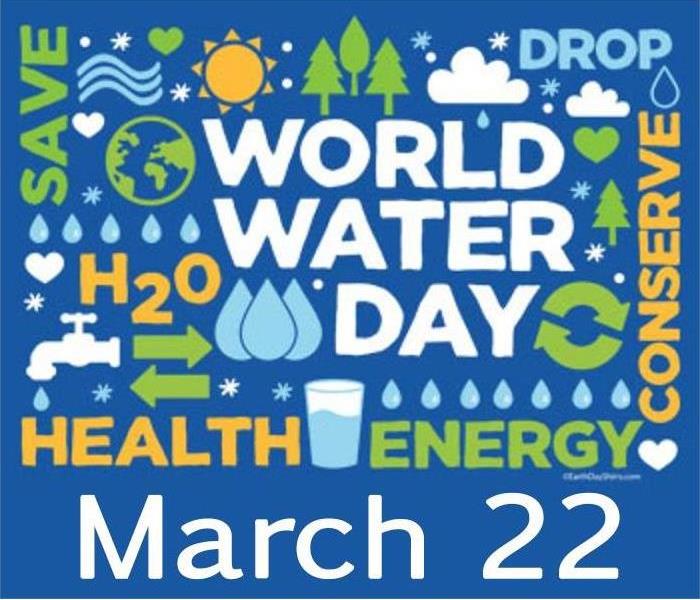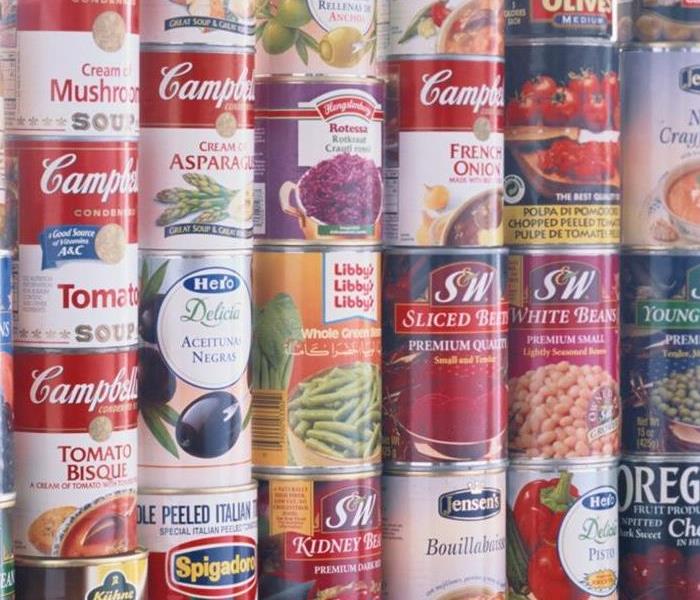Recent Community Posts
Helping the Community and the Enviroment
10/17/2023 (Permalink)
 Reusable trash receptacles are not only easier to spot but they are more ecological than disposable receptacles often used at outdoor events.
Reusable trash receptacles are not only easier to spot but they are more ecological than disposable receptacles often used at outdoor events.
Every year we get request from event organizers asking us to supply trash receptacles for outdoor events and we're happy to oblige free of charge! Instead of the loading up our land fills with disposable cardboard receptacles we invested in durable plastic cans that can be used multiple times. In addition to using these cans at outdoor events we have also supplied them to are fire departments for use in their stations and also for them to use at the scene of fires and accidents. In the future we pan to donate them to area parks in the smaller communities we service where money for maintenance is tight. Taking care of our environment is important not only for now but for generations to come.
World Water Day 2021
3/1/2021 (Permalink)
World Water Day is an international observance and an opportunity to learn more about water related issues, be inspired to tell others and take action to make a difference. World Water Day dates back to the 1992 United Nations Conference on Environment and Development where an international observance for water was recommended. The United Nations General Assembly responded by designating March 22, 1993 as the first World Water Day. It has been held annually since then.
The theme in 2021 is Valuing Water. Water means different things to different people. This conversation is about what water means to you. How is water important to your home and family life, your livelihood, your cultural practices, your wellbeing, your local environment? By recording - and celebrating - all the different ways water benefits our lives, we can value water properly and safeguard it effectively for everyone.
World Water Day is an opportunity to learn more and be inspired to tell others. Read reports, watch videos and download teaching material from the international water community.
https://www.worldwaterday.org/
February is National Canned Food Month
2/4/2021 (Permalink)
February is National Canned Food Month. Canned food is a great way to prepare for a natural disaster, as it has a long shelf life when stored at the correct temperature. It's also an easy way to make cooking a lot faster with products like crushed tomatoes and diced chicken. Plus, it's an inexpensive way to get out-of-season produce.
While homes can certainly use canned goods, another place that needs them is your local food pantry. Food pantries can help low income families make it to their next paycheck without missing meals. Some foods come ready to eat, which is helpful for folks who don't have access to a stove or kitchen. Consider donating your time, efforts, or money to a local food charity. Money is often better for food charities because they can buy things at a wholesale rate, which means they get more for the money than you would in a grocery store.
If you'd prefer to donate goods, here are some common things that food banks need:
- peanut butter
- canned tuna and chicken
- shelf-stable milk and substitutes
- 100% juice
- oatmeal
- rice
- low sodium soups
- beans
- pasta
About SERVPRO of Boyd, Carter, Greenup and Lewis Counties
SERVPRO of Boyd, Carter, Greenup and Lewis Counties specializes in the cleanup and restoration of residential and commercial property after a fire, smoke or water damage event. Our staff is highly trained in property damage restoration. From initial and ongoing training at SERVPRO’s corporate training facility to regular IICRC-industry certification, rest assured our staff is equipped with the knowledge to restore your property.
Need Emergency Service? Call Us 24/7 – (606) 836-8000
September - National Preparedness
9/1/2017 (Permalink)
September is recognized as National Preparedness Month (NPM) which serves as a reminder that we all must take action to prepare, now and throughout the year, for the types of emergencies that could affect us where we live, work, and also where we visit.
This week's focus is on Individual Preparedness. Seriously consider putting together an emergency kit for your family, similar to the one shown in our profile picture.
It is important that you and your family have a plan!
- Water - one gallon of water per person per day for at least three days, for drinking and sanitation
- Food - at least a three-day supply of non-perishable food
- Battery-powered or hand crank radio and a NOAA Weather Radio with tone alert
- Flashlight
- First aid kit
- Extra batteries
- Whistle to signal for help
- Dust mask to help filter contaminated air and plastic sheeting and duct tape to shelter-in-place
- Moist towelettes, garbage bags and plastic ties for personal sanitation
- Wrench or pliers to turn off utilities
- Manual can opener for food
- Local maps
- Cell phone with chargers and a backup battery
Follow #NatlPrep for tips. More info: www.ready.gov/september
National Preparedness Month
9/20/2016 (Permalink)
September is recognized as National Preparedness Month (NPM) which serves as a reminder that we all must take action to prepare, now and throughout the year, for the types of emergencies that could affect us where we live, work, and also where we visit.
This week's focus is on Individual Preparedness. Seriously consider putting together an emergency kit for your family, similar to the one shown in our profile picture.
Follow #NatlPrep for tips. More info: www.ready.gov/september
Heat Wave Safety Tips
7/20/2016 (Permalink)
With local temperatures forecasted to stay in the 90s throughout the weekend we wanted to take the opportunity to share some tips for staying healthy and safe during a heat wave.
In recent years, excessive heat has caused more deaths than all other weather events, including floods. A heat wave is a prolonged period of excessive heat, generally 10 degrees or more above average, often combined with excessive humidity.
What To Do During a Heat Wave
- Never leave children or pets alone in enclosed vehicles.
- Stay hydrated by drinking plenty of fluids (WATER!) even if you do not feel thirsty.
- Avoid alcohol, tea, coffee, caffeinated beverages and hot, spicy foods that can make dehydration worse.
- Eat small meals and eat more often.
- Try eating more cold foods like salads and fruits. They contain water and are more refreshing in hot weather than hot foods.
- Avoid extreme temperature changes.
- Wear loose-fitting, lightweight, light-colored clothing made from natural fibers, like cotton or linen. Avoid dark colors because they absorb the sun’s rays.
- Wear a hat or take an umbrella with you for shade if you’re outside on a hot day.
- Slow down, stay indoors and avoid strenuous exercise during the hottest part of the day.
- Postpone outdoor games and activities.
- Use a buddy system when working in excessive heat.
- Take frequent breaks if you must work outdoors.
- Check on family, friends and neighbors who do not have air conditioning, who spend much of their time alone or who are more likely to be affected by the heat.
- Check on your animals frequently to ensure that they are not suffering from the heat.
 Reusable trash receptacles are not only easier to spot but they are more ecological than disposable receptacles often used at outdoor events.
Reusable trash receptacles are not only easier to spot but they are more ecological than disposable receptacles often used at outdoor events.





 24/7 Emergency Service
24/7 Emergency Service



